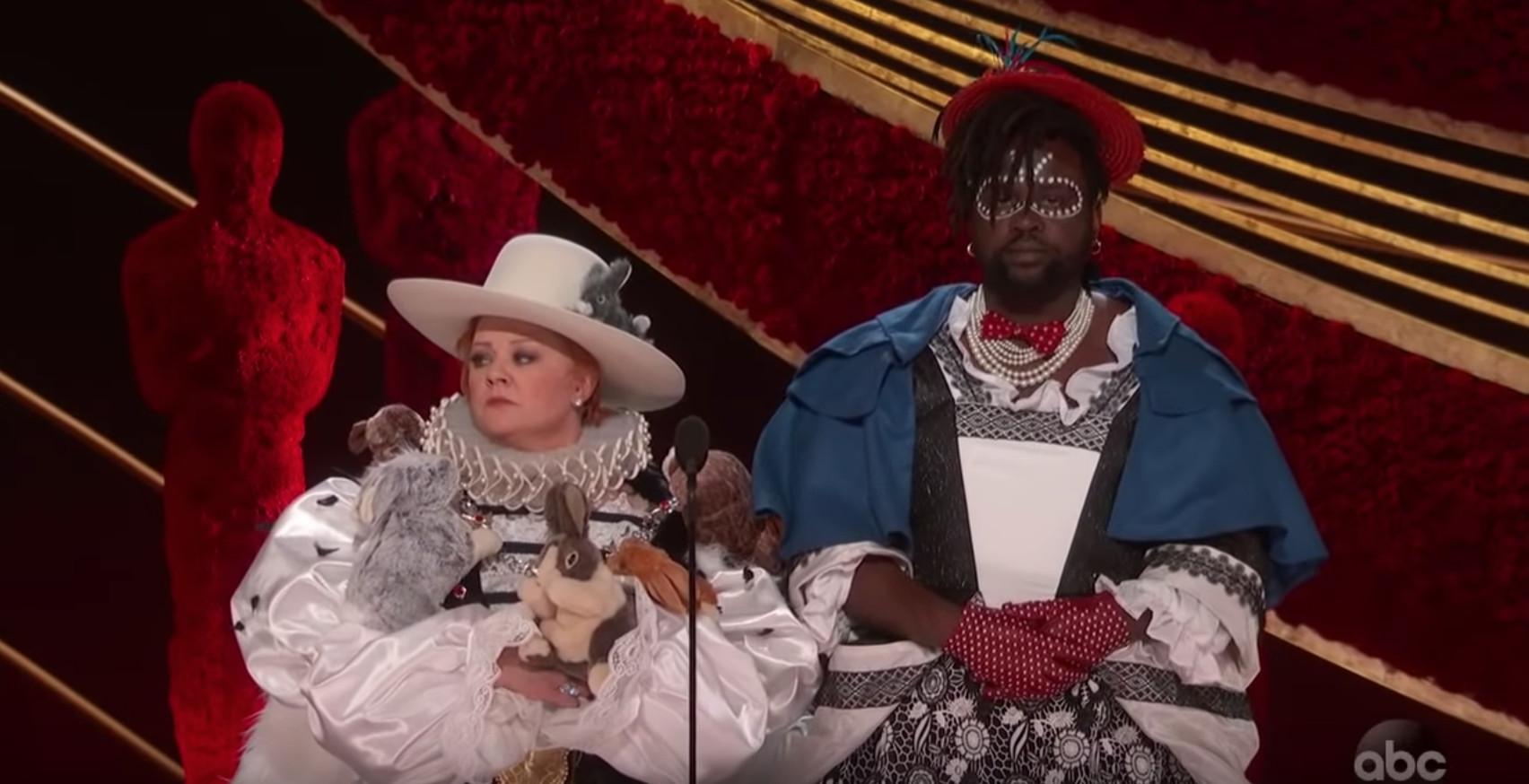With the dust settled on the 2019 Oscars, it’s time to take stock of a ceremony that once seemed destined to be a catastrophe. The lead-up to the Oscars was defined by a tight Best Picture race that was difficult to predict, which isn’t a bad thing—in fact, it gave the show some exciting stakes. But this awards season was also marred by a Kevin Hart fiasco that forced the Academy to go hostless for the first time in 30 years; an attempt to install a Best Popular Film category that backfired amid a chorus of fury; and a similarly unpopular move to remove song performances and the awarding of four categories from the telecast. It seemed like every time the Academy tried to take one step forward and appeal to the masses, it fell down a flight of stairs.
The expectations heading into the Oscars were low: Anything that wasn’t a disaster would have sufficed for the Academy. But while this year’s ceremony wasn’t without its problems—namely, the big one at the end of the night, when Green Book won Best Picture and became the next Crash—overall it was an undeniable success. This year’s Oscars saw a ratings bump for the first time in five years, Variety reported, with nearly 30 million viewers, an increase of about 12 percent over 2018. It was still the second-lowest-rated Oscars telecast to date, but progress is progress at a time when live-viewing numbers are dwindling and attention is split among so many other entertainment options.
That’s great news for the Academy. How, exactly, can it replicate its ratings boost in 2020 and beyond? Here are four takeaways from this year’s ceremony that the Oscars could consider in the future—for the sake of an entertaining telecast and its own mainstream popularity.
Is a Host Really Necessary?
The last time the Oscars went without a host, in 1989, the opening musical number was a disaster, incredibly labeled on YouTube as “the 11 minutes that ruined Hollywood producer Alan Carr’s career forever.” That explains (if not justifies) why the Academy was so desperate to get Hart to host, even after he brazenly refused to apologize for his previous anti-LGBT remarks.
But this wasn’t 1989, and the hostless Oscars of 2019 went from a brief Adam Lambert–Queen performance to a glorious three-minute bit from Amy Poehler, Tina Fey, and Maya Rudolph to the first award of the evening. It wasn’t perfect. Lambert’s performance somehow made Queen seem like a cover band, but the opening minutes were brisk, smooth, and competent, if not delightful. After all the drama that haunted the Academy in 2018 as it struggled to find a host, going into the first commercial break you had to wonder: Does this show really need a host?
Would this year’s Oscars have been improved with a long opening monologue and a few skits interspersed through the night? What are people really tuning into the Oscars for? With every musical performance aside from Lady Gaga and Bradley Cooper’s sultry rendition of “Shallow” registering as the perfect time to take a bathroom break, don’t we need to cut even more excess fat from the ceremony, rather than add more features?
It would be surprising if the Academy committed itself to a hostless future; this was a particularly strange year. Plus, a host-free Oscars is probably easier to digest when the show runs smoothly. I’m not sure what would’ve happened if we had seen a repeat of the La La Land–Moonlight Best Picture fiasco without Jimmy Kimmel to help right the ship. But given the awards show’s propensity to exceed its runtime—the Oscars broadcast is ideally supposed to end at 11 p.m. ET, and even this comparatively fast show still ran 15 minutes late—it’s something the Academy should consider.
Make the Award Presentations More Like This
Certain aspects of the Oscars blend together every year: There are only so many ways celebrities can present an award without the process seeming derivative. So consider Melissa McCarthy’s and Brian Tyree Henry’s wardrobe Sunday night an official challenge to make presenting more entertaining, and much weirder.

It’s a little bit of The Favourite, a little bit of Mary, Queen of Scots (McCarthy removed her hat to reveal a head of messy, balding red hair, like Margot Robbie’s Queen Elizabeth I), and a whole lot of fun. If next year’s Oscars ceremony doesn’t include someone absurdly famous dressing up as Mufasa or Thanos—or both, live a little!—the Academy is making a grave mistake.
Make History, No Matter How Belated
The Green Book win notwithstanding, this year’s Oscars made history in key categories. Two of Black Panther’s wins—Hannah Beachler for Production Design and Ruth E. Carter for Costume Design—marked the first time black women were recognized in their respective categories. Plus, Mahershala Ali became the first black man to win two Best Supporting Actor Oscars, a feat he accomplished in a three-year span. The Academy also built up goodwill by finally acknowledging the great work of Spike Lee with a Best Adapted Screenplay win for BlacKkKlansman. The nod fell into the tradition of the Academy commemorating a career of excellence—and making up for past snubs—rather than a specific film, but was much-welcomed nonetheless.
These were important breakthroughs, and each led to some of the most indelible moments of the night. With the Academy diversifying its membership, these wins and historic accomplishments could elevate other categories at future ceremonies. There’s still a lot of progress for the Oscars to make. It was only last year that a woman was first nominated for Best Cinematography (Rachel Morrison, Mudbound); how much longer do we have to wait for our first female cinematographer winner?
It’s clear after Green Book’s Best Picture win that progress in some areas doesn’t belie progress in all areas; the Academy will always find a way to shoot itself in the foot. But historical moments—such as that of Beachler, Carter, and Lee—are what make for entertaining and raw TV. Who didn’t enjoy Lee commending the New York Knicks’ tanking efforts on live television before jumping into the arms of an equally excited Samuel L. Jackson?
More Awards for Popular Films—Just Don’t Make It “Best Popular Film”
What could’ve inspired the ratings spike for the 2019 Oscars? Maybe people were enamored of what was largely a great year for movies. Maybe some were curious to see what kind of dumpster fire the hostless Oscars would be. Or maybe it’s much simpler than that: Maybe more people tuned in because they wanted to see their favorite films get recognized on Hollywood’s biggest night.
Whether or not you enjoyed them, Black Panther, A Star Is Born, and Bohemian Rhapsody all had broad appeal, raking in hundreds of millions of dollars at the box office—and all of them were Best Picture nominees. The Oscars have been in a ratings free fall for years—and this year is a success only because it didn’t continue the trend—but the most successful years have always been elevated by popular movies. The 1998 ceremony, featuring Titanic, had a whopping 55.2 million viewers, while the 2010 ceremony, in which James Cameron’s Avatar lost to Kathryn Bigelow’s The Hurt Locker, garnered 41.7 million viewers, the highest figure since 2005.
This is the crux of the Academy’s efforts to install a Best Popular Film category: It wants to recognize the movies with the broadest appeal. But the Best Popular Film compromise—at least in the way it was presented before this year’s ceremony—would have the unintended effect of casting off well-made, critically acclaimed box office hits to a category that wouldn’t have the same prestige as Best Picture. It also disregards the fact that crowd pleasers like Titanic, The Godfather, Gone With the Wind, and The Lord of the Rings: Return of the King have all been Best Picture winners in years past. Black Panther and A Star Is Born didn’t need a separate category this year because they were popular: They were Best Picture nominees because they were good enough to hold their own in the field.
The Academy is caught between trying to recognize the best movies and the most-liked movies at the same time. While the expansion of the Best Picture category from five movies to up to 10 in 2009 was meant to appease both cinephiles and casual moviegoers, the Oscars of years past have more often filled the extra nominee slots with movies with even less commercial success. But the 2019 ceremony was a push in the right direction. The massively popular Black Panther was right next to the lovable weirdo The Favourite; A Star Is Born rubbed shoulders with the politically inclined Vice. In stark contrast to recent years, more fans of more things had a reason to tune in. This should be the goal every year—not to cast off popular movies to their own categories, but to appreciate popular movies on equal footing. If at the 2020 Oscars a blockbuster like The Lion King or Avengers: Endgame gets lumped in with A24’s The Souvenir, everyone will win.
